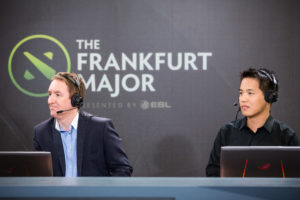Paul ‘ReDeYe’ Chaloner is a name synonymous with esports. The esteemed host, commentator and analyst has been in and around the industry for the best part of two decades, commentating on over 50 titles in an astonishing career. He’s travelled to every continent, covering a plethora of tournaments of various sizes – including being the main host of the biggest event (by prize-pool) in esports history: The International 6.
ReDeYe has covered popular EA Sports title FIFA for several years. With the huge wave of investment that the esport has recently seen, ESI caught up with Paul to get his thoughts on the investment and FIFA’s potential growth as a competitive game.

ESI: Hi Paul, thanks for your time. There’s been loads going on in FIFA recently with investment coming in from all over the place. One of the announcements was the “VFO” with a potential 11 versus 11 tournament being created. What are your thoughts?
My thoughts on 11 versus 11 are simply that I don’t think it’ll work. . FIFA is a 1 versus 1 game, or a 2 versus 2 game at best. 2 versus 2 is quite fun but again it’s not easy. If leagues were able to develop a feasible 2 versus 2 format, that might be quite fun. La Liga’s VFO may want to make it eleven versus eleven but it’s just another example of a company entering esports in the wrong way. They’ve come in and thought: “Ooh esports! That looks fun – let’s do it like this because it hasn’t been done before”.
“I can tell you now, there’s a bloody good reason why it hasn’t been done like that before. Because it sucks.”
ESI: What do you think it is that makes 11 versus 11 unfeasible compared to the traditional 1 versus 1 format?
We have to remember that it’s a virtual world. When I spectate FIFA, I can’t see all eleven players on the field at any one time like when I go to a real football match. The focus is on the player with the ball in FIFA and that’s why it works so well as a 1vs1 game. Probably the main reason that FIFA developed as a 1vs1 esport was because early on in esports it was cheap to get FIFA players to come to your tournament. Organisers only had to fly one person in to compete – they didn’t have to fly eleven people in nor 5 or 6 and therefore from the competitive side it has always developed as a 1 versus 1 game.
The idea in FIFA is more that the player is like an on pitch manager. He’s not a striker, a defender, nor a goalkeeper. 11 versus 11 is an interesting concept and I’m happy to see what they do with it and I’d happily be proved wrong but I just don’t see it working.
ESI: Investment in FIFA has gone pretty mental in the last month or so. It doesn’t tend to fit the traditional fast-pace esports mould – so what draws spectators?
I think with FIFA it comes down to two factors. The first is how you broadcast the esport. There’s been some fabulous tournaments in the space. Take FIWC for example – it’s a tournament that’s had some of the most traction in esports over the last few years. They’ve brought in ex-professional players which tends to work well. I’ve worked alongside a number of professionals and ex-pros (e.g. Alan McInally) and they genuinely put a lot of heart and soul into the event. If you ask anyone that watched the FIWC finals they would tell you it was absolutely incredible.
Secondly, my view is that FIFA is effectively the gateway drug to esports. The fact it might not have big stream numbers and the casual guys on YouTube have the big followings compared to actual pros – it shouldn’t judgement as to whether or not it’s a decent esport. It’s the perfect esport to get people involved in. It’s so easy for me to take someone along to a FIFA event and they understand it immediately – it’s just football.
“Secondly, my view is that FIFA is effectively the gateway drug to esports.”
They understand the basic rules of the game, they understand what the player is doing and trying to achieve, so I can explain it in under 20 seconds. From there it’s a lot easier to take them to a Counter-Strike or a Call of Duty event and from there it becomes more feasible to take them to an even more complex League of Legends/Dota 2 / Starcraft 2 event.
ESI: So on the back of that – is FIFA integral to the overall growth of the esports eco-system?
Let me say that I think FIFA still has a huge part to play in the growth of esports as an industry. I hope it’ll get bigger and with national leagues on the way and more and more teams picking up players it seems to be heading in the right direction. With teams adopting players, paying them a salary and putting shirt numbers on their backs FIFA and esports will receive wider mainstream exposure as well.
I absolutely think FIFA has a future as an esport, I just don’t think it will ever be as big as say CS:GO, League of Legends or Dota 2.
ESI: E-Ligue 1 has been announced and more and more players are being signed by professional players. For the absolute pittance that it costs football clubs – it seems to make a whole lot of sense. What are your thoughts?
You’re completely right. You know what, though, people haven’t really thought about or addressed why these teams are signing young FIFA players. The reason I believe that it makes genuine sense is this statistic: “less than 10% of the audience that watched Premier League games was aged between 16 and 35 last season”.

If you apply that same figure to people who purchase merchandise and support the clubs – it means that ten years from now football may be in huge decline. What teams are doing is effectively buying future fans. By signing people like Sean Allen to West Ham United and paying him a bit of money (which is great for him but hardly a lot in terms of football – it’s not Wayne Rooney type money) and putting his name on the back of a shirt – he becomes part of the West Ham squad. He’s out there competing as an ambassador for FIFA and West Ham and younger people are starting to notice that.
I think if we had, for instance, a Virtual UK Premiership (which I’ve been touting for many years) it would be fantastic. It could even grow to span multiple leagues. We could have a 20 player Premier League that was going on weekend after weekend with pro players wearing their shirts and being ambassadors. It would be fantastic. You could even take that on the road. There’s scope for an FA Cup, a League Cup – literally everything. How fantastic would that be?
ESI: It would indeed be a sight to behold! Did you get a chance to read Gianni Infantino’s comments about FIFA (the federation) getting involved with the esports side?
Indeed I did read the comments, and I’m pleased that they’ve acknowledged that the virtual side of FIFA needs support. I’m a little troubled with the fact that they are a little bit late to the party and that they want to apply old FIFA principles. I’m a sceptic when it comes to FIFA – their problems are well publicised over the last few years and I’m not entirely sure that them bringing their ethics to esports is the way forward when our ethics are much better right now. They kind of need to learn from us rather than the other way round.
If FIFA want to get involved in esports I welcome that and think it’s fantastic. I hope that they don’t come in and stomp all over it and think they can run it. Actually, we can use their experience to help us understand things better but also they need to understand that we’re a very unique industry and work with us rather than against us.

